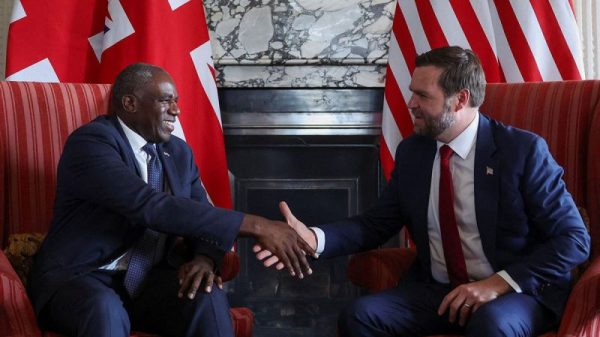Carolina Aló was 17 years old the night her father, Edgardo, saw her for the last time. In their final conversation, he pleaded with Carolina to leave her boyfriend because of the way he treated her.
Almost 30 years later, Edgardo remembers the following night as if it were today.
By the time he arrived, his daughter was already dead. She had been stabbed 113 times by her boyfriend Fabián Tablado a week before her 18th birthday.
That cold Monday in 1996 was the beginning of a long fight by Edgardo to get justice for his daughter – one that would span decades and culminate in his testimony playing a pivotal role in a wider campaign to revise Argentina’s penal code to recognize femicide as an aggravating factor in homicide cases.
That campaign – led by women’s movements and human rights organizations – finally succeeded when Argentina’s government changed the code in 2012, but now, more than a decade on, many campaigners like Edgardo are wondering if their fight was in vain.
On January 24, Argentina’s Minister of Justice Mariano Cúneo Libarona warned on X that the government of President Javier Milei would seek to eliminate femicide from the penal code on the grounds it was a distortion of the concept of equality.
“This administration defends equality before the law, as enshrined in our national Constitution. No life is worth more than another,” he wrote.
Critics say the move is just the latest by the right-wing Milei government to clamp down on women’s rights. It comes after the president spoke out against the concept of femicide and what he called “radical feminism” at the World Economic Forum in Davos.
“We have even got to the point of normalizing the fact that in many supposedly civilized countries, if you kill a woman, it is called femicide. And this carries more serious punishment than if you kill a man simply based on the sex of the victim – legally making a woman’s life be worth more than that of a man,” Milei told the forum.
But campaigners warn that such reform misunderstands the nature of femicide and will put Argentine women in greater danger.
“The violent death of women for reasons of gender is often perpetrated by people in their inner circle, generally current or former partners, or even by strangers, but in a context that includes contempt for the victim, humiliation and sexual assault,” explained Natalia Gherardi, a lawyer specializing in gender and co-director of the network of health and legal professionals RedAas.
“In general, men are more likely to be victims of murder, but the difference is that women are more likely to be murdered by people in their circle of trust. If one does not understand that the form, the way, the place, the perpetrator of this extreme violence is different, there is no way to have adequate policies to protect these women,” said Gherardi.
According to the Ombudsman’s Office of the Nation, from January 1 to November 15, 2024, there were 252 femicides in Argentina. Two thirds of the victims were murdered at home, while 84% were killed by someone with whom they had a previous relationship.
‘I had to go out and fight’
At the time of Carolina’s killing in the 1990s, sentences for men who killed women in the context of gender violence ranged between eight and 25 years in prison – and these could be reduced by mitigating factors such as good conduct in prison.
For Edgardo, the 24-year sentence handed to his daughter’s killer was too lenient; in his view, it failed to reflect the full horror of her killing. The more than 100 stab wounds inflicted on his daughter were made with at least three different knives. Yet her death was classified at the time as “simple homicide,” according to the sentence.
Experts on femicide say it is exactly these sort of details that single it out as distinct from other homicides, that may or may not involve a woman.
As Mariela Belski, executive director of Amnesty International Argentina, puts it: “A femicide is always a homicide, that is, the death of a person at the hands of another. However, the murder of a woman is not necessarily a femicide. For it to be considered a femicide, there must be a particular violence, a specific context. Femicides are rooted in a system that reinforces discrimination against women’s lives. At the same time, they reproduce stereotypes of masculinity associated with physical strength and the power to control women.”
In Edgardo’s case, he was shaken too by the knowledge his daughter’s murderer was asking to be released early and his fears of what might happen to other women. (Indeed, while in prison Tablado was found guilty of threatening another one of his partners, and had an extra two years and six months added to his sentence).
So Edgardo set about knocking on doors, spending years meeting lawyers, jurists and presidents, joining a wider movement by campaigners to change the law.
“I had to go out and fight because the law did not protect me. The judges did not protect me,” Edgardo recalls.
Living in fear
After years of pushing, Edgardo and his fellow campaigners were rewarded with a bittersweet victory in 2012, when the change to the penal code recognized femicide and upped the maximum sentence to life imprisonment.
Now, more than a decade later, under the Milei government, that hard-fought victory is coming under threat.
One of the first signs came in August 2024, when Milei’s government weakened a support program that provides subsidies to victims of gender-based violence so that they do not have to stay in the place where they are being abused – which for many, is in their family home.
The government’s move reduced the length of support from six to three months and introduced a requirement that applicants produce a police report confirming their situation. But critics point out that many victims of domestic violence feel too scared to go to the police in the first place.
As Belski, of Amnesty International, put it: “It is extremely worrying that the specificity of this type of crime and the obligations of the Argentine state to prevent, punish and eradicate violence against women, which have constitutional roots, are not understood.”
Meanwhile, 28 years and eight months later, Fabián Tablado is now free, having served his sentences.
The courts have assigned him an electronic ankle bracelet and a restraining order to protect his ex-partner and Edgardo Aló – an order he has in the past violated.
Edgardo says he lives with an anti-panic button in his pocket.
For him, life was put on hold in 1996. Every Christmas, he says, he keeps a glass on the family table for his beloved daughter.






































